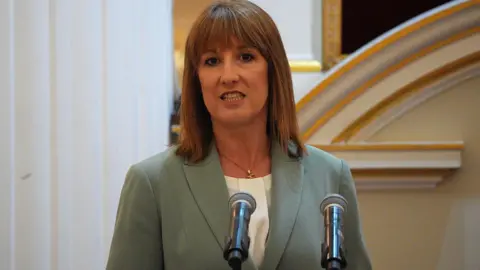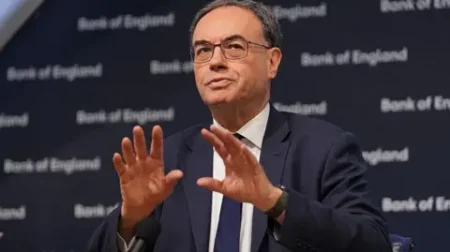In a recent call for a more positive outlook on investment, Chancellor Rachel Reeves addressed the financial industry regarding the ongoing negative perceptions surrounding savers investing in stocks and shares. During her speech at the annual Mansion House dinner in the City of London, Reeves emphasized the need to shift the narrative from one that is predominantly focused on the risks associated with investing to one that highlights the substantial benefits that come with prudent investment decisions.
Reeves remarked, “For too long, we have presented investment in too negative a light, quick to warn people of the risks without giving proper weight to the benefits.” This statement reflects the government’s commitment to encouraging more individuals to consider investing some of their savings in the stock market rather than keeping it solely in low-yield cash savings accounts. The Chancellor’s remarks signal a strategic initiative aimed at fostering a more investment-friendly atmosphere, particularly as the government’s collaboration with the financial regulator intensifies.
As part of her proposed measures, Reeves indicated that the government would cease its plans to cut the tax-free limits on Individual Savings Accounts (ISAs), a move that could have sparked backlash among financial institutions. This decision comes in the context of a broader goal: to redirect a significant portion of the approximately £300 billion currently held in cash ISAs into more productive investments within the UK economy.
Reeves’ speech called attention to the complexities in the current financial advice ecosystem, which she claims has made it difficult for individuals to access the reliable guidance needed to make informed investment decisions. She stated, “Our tangled system of financial advice and guidance has meant that people cannot get the right support to make decisions for themselves.” This declaration benchmarks the government’s intent to introduce targeted consumer support initiatives in collaboration with the Financial Conduct Authority (FCA) ahead of the upcoming financial year.
Moreover, the urgency for economic growth is palpable as recent data indicated a contraction in the UK economy during the month of May, following a similar downturn in April. These disconcerting statistics have intensified pressures on the government to formulate mechanisms that will encourage economic vitality and investor confidence. Adding to the economic discourse, speculation regarding potential tax increases has surfaced, particularly following reversals on previous policy decisions related to welfare benefits. Some Labour MPs, for instance, have floated the idea of instituting a wealth tax on assets exceeding £10 million to generate additional revenues estimated at around £24 billion annually.
Sir William Russell, the former Lord Mayor of the City of London, echoed concerns about the prevailing uncertainty in the market. He commented on the detrimental effects stemming from anticipated delays in policy decisions, stating, “That pause doesn’t help because there is uncertainty, and if there’s one thing we all would agree with, the City does not like uncertainty.” In light of Reeves’ efforts, there remains hope that consumers could be incentivized to “reap the benefits of UK economic success” through increased participation in the investment landscape.
Despite these optimistic forecasts, Reeves acknowledged the inherent risks associated with investments, reminding her audience that the value of shares can fluctuate considerably. Savers, traditionally cautious about stock market exposure, must navigate the tension between potential returns and the very real concern of inflation eroding their purchasing power. In the past, initiatives such as the public offering of shares in Royal Mail and the iconic “tell Sid” campaign to privatize British Gas in the 1980s serve as historical precedents leaning towards fostering citizen investment.
In concluding her speech, the Chancellor humorously reflected on her own mixed experiences of the past weeks. She recounted an interaction with a schoolgirl who queried her about her dream job, quipping that under the current circumstances she could humorously suggest, “anything but Chancellor”. As a way forward, she confirmed a commitment to continued consultation about enhancing ISAs and detailed ongoing reforms aimed at modernizing the financial services sector.
Reeves’s intentions signal a pivotal moment for investors, as the government strives to create a balanced framework that promotes growth without compromising regulatory integrity. Her remarks resonated through the room at Mansion House, calling upon industry leaders to embrace a more hopeful narrative about investment that values enterprise and innovation, essential ingredients for Britain’s economic recovery.











